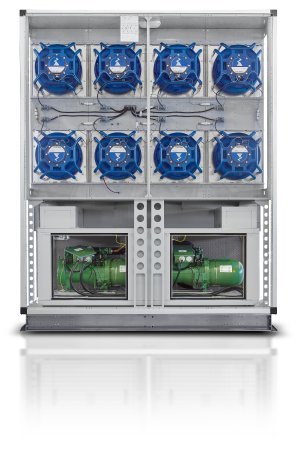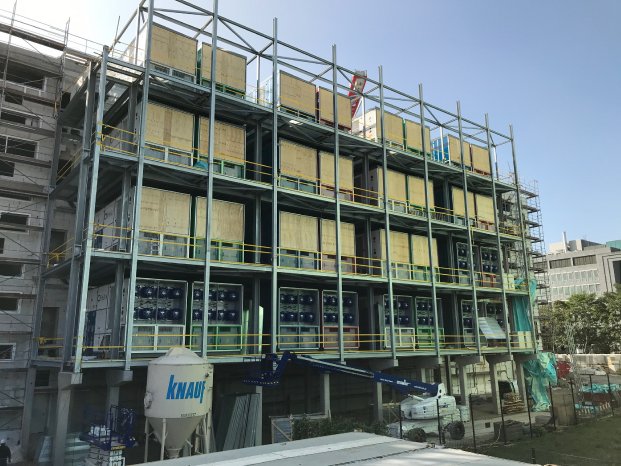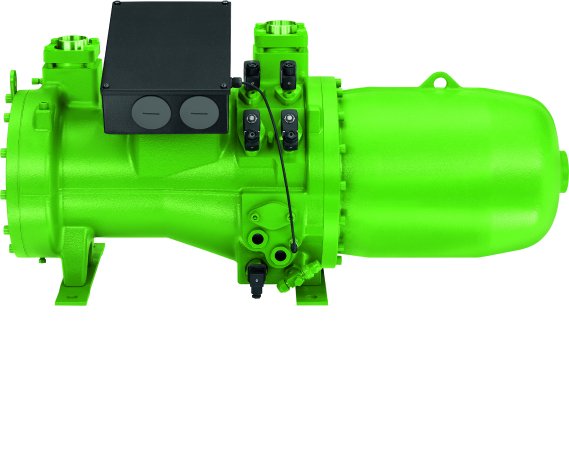Over the years, technological advancements and the steadily growing volume of data have led to a constant increase in heat loads in computing centres. This is because servers cannot perform optimally without consistent moderate temperatures which require constant cooling. This makes the reliability of the refrigeration system an essential factor: the more constant the cooling, the more stable and efficient the processes.
The Italian company HiRef S.p.A. specialises in manufacturing air conditioning systems for areas containing technical hardware and technology. Its air conditioning solutions for the IT sector are considered exceptionally efficient and help lower energy consumption and, in turn, running costs. The task was to design a cooling system that is both as reliable and sustainable as possible for a computing centre in the German city of Offenbach, in cooperation with Cooltec Systems Kälte Klima GmbH. As HiRef had been using BITZER compressors for years, it came to the specialists in Sindelfingen with this project, too. As selecting a sustainable refrigerant was of key importance, HiRef opted for an extraordinary solution: for the first time, 96 screw compressors with external frequency inverters were installed in the 48 cooling systems instead of scroll compressors.
High energy efficiency at full and part load
As one of the first HiRef systems with the adiabatic system, this project was of special significance. ‘We wanted there to be no doubt that the quality of our environmentally friendly and sustainable solution surpasses everyone else in the market – that is another reason why we used screw compressors instead of scrolls,’ says Wolfgang Fels, Commercial Director at HiRef. With screw compressors, certain temperature levels can be maintained precisely and constantly. If the preset maximum temperature set point is exceeded, the evaporative cooling system lowers the condensing temperature and therefore the energy intake. Speed-controlled by frequency inverters, the screw compressors provide full mechanical backup for the cooling capacity. ‘Capacity control makes the screw compressors extremely energy efficient at full and part load,’ explains Fels. ‘This way, they make a valuable contribution to reducing CO2 emissions.’ Their low water consumption with additional adiabatic cooling is another important step in the direction of sustainability.
Environmental protection pays off
The requirements stipulated by the EU’s F-Gas Regulation 517/2014 represent a huge challenge for owners of air conditioning systems. In order to meet the phase-down objectives, alternative low-GWP refrigerants, such as hydrofluoroolefins (HFOs), will have to be used in the future. Industrial refrigeration systems must be reliable and run efficiently, while meeting increasingly strict requirements in terms of their environmental compatibility. That is why HiRef designed the system with the low-GWP refrigerant R513A (A1-certified with a GWP of 573), an effective and environmentally compatible alternative to conventional refrigerants. One special feature is that the screw compressors are already preconfigured so that the user can switch to the refrigerant R1234ze at a later date. R1234ze has even less of an impact on the greenhouse effect, is not toxic, is moderately flammable and has a GWP of less than 6. The low GWP reduces the frequency of the mandatory leak checks required by the F-Gas Regulation, which has a positive effect on operating costs. ‘Environmental protection and efficiency go hand in hand here and set an example,’ sums up Pietro Trevisan, General Manager at BITZER Italia. ‘The excellent environmental properties give operators of the system more peace of mind in terms of refrigerant and device price stability, as well as long-term availability.’
Highly resistant and reliable technology
Every system has a cooling capacity of 200 kW and is fitted with EC fans with optimised free-running wheels. A special high-efficiency crossflow heat exchanger with an epoxy coating makes the system extremely resistant. The double-ended parallel electrical feed has a quick-start feature as well as uninterrupted control of the power supply. The cooling process is based on three different principles: full free cooling with a winter bypass, needs-based, modulating, mechanical cooling with maximised free cooling, and modulated, mechanical cooling with an adiabatic spray system in the condenser.
The integrated oil separator in the BITZER CSH65 screw compressors and the built-in suction-gas-cooled motor simplify system integration tremendously and allow for a compact, cost-efficient system design. Besides lower life cycle costs and 24/7 reliability under any operating conditions, sound insulation was of critical importance in this project. The compressors’ special enclosure ensures maximum sound insulation, while the integrated pulsation mufflers greatly reduce sound on the exhaust air side.
The first phase of the system was completed in summer 2020. The system went into operation in November 2020, following a trial phase in October. ‘The use of screw compressors instead of scroll compressors for the first time posed extraordinary challenges that required a high degree of expertise in this project. We are familiar with BITZER from numerous other projects and were certain that we would be able to find the ideal solution with them,’ says Wolfgang Fels of the joint project.
About the F-Gas Regulation
The requirements stipulated by the EU’s F-Gas Regulation 517/2014 represent a huge challenge for manufacturers of refrigeration compressors. In order to meet the phase-down objectives, alternative refrigerants such as HFOs will have to be used in the future. Industrial refrigeration systems must be reliable and run efficiently in the long term, while meeting increasingly strict requirements in terms of their environmental compatibility. The global warming potential, or GWP, is an indicator of the risk a refrigerant poses to the climate. The GWP of R134a, a commonly used refrigerant nowadays, is 1300. In other words, if one kilogram of R134a escapes into the atmosphere, its impact on the climate will be 1300 times more severe than one kilogram of CO2.
About adiabatic cooling
Adiabatic cooling is a method of controlling the temperature of rooms with the evaporative cooling power of air and water. It is based on a simple principle: when water evaporates in a closed system, it absorbs heat from that system and therefore lowers the temperature of the system. In air conditioning, adiabatic cooling is used in such a way that the air flow is humidified and in turn cooled. Every gram of water with which unsaturated air is humidified lowers its temperature by around 2.5°C. As such, adiabatic cooling utilises natural processes and saves electrical energy for the cooling systems.
As an independent specialist for refrigeration and air conditioning technology, BITZER is present all over the world: with products and services for refrigeration, air conditioning and process cooling as well as transport, BITZER ensures optimum temperature conditions for trade in goods, industry processes and indoor climate control – always striving for the highest possible energy efficiency and quality. BITZER is represented all over the world with 72 sites in 38 countries, including its sales companies and production facilities. Trade and service partners included, the BITZER network of manufacturing, development and sales extends to almost all countries in the world. In 2021, over 3,900 employees generated a turnover of €928 million; expenditure for research and development totalled €47 million.
Overview of images
Images may only be used for editorial purposes. This usage is free of charge if ‘Photo: BITZER’ – and a free copy of the publication is sent to us. Images may not be modified or altered, except to crop out the background surrounding the main subject.





